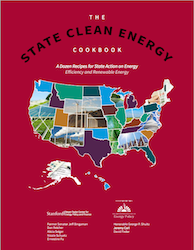States are implementing renewable energy and energy efficiency program that could be adopted by their neighbors to improve their economies and reduce emissions cost-effectively according to a joint study by Stanford University’s Steyer-Taylor Center for Energy Policy and Finance and Hoover Institution’s Shultz-Stephenson Task Force on Energy Policy. These policies could be particularly valuable as states develop plans to meet pending U.S. Environmental Protection Agency regulations to cut power plant carbon emissions.
 “The State Clean Energy Cookbook: A Dozen Recipes for State Action on Energy Efficiency and Renewable Energy,” was led by former U.S. Senator Jeff Bingaman and former Secretary of State and Treasury George Shultz. The report analyzes and makes specific recommendations regarding 12 policies that states are using today to encourage energy efficiency and renewable energy. It also analyzes the U.S. Department of Energy’s (DOE) State Energy Program, which assists all 50 states.
“The State Clean Energy Cookbook: A Dozen Recipes for State Action on Energy Efficiency and Renewable Energy,” was led by former U.S. Senator Jeff Bingaman and former Secretary of State and Treasury George Shultz. The report analyzes and makes specific recommendations regarding 12 policies that states are using today to encourage energy efficiency and renewable energy. It also analyzes the U.S. Department of Energy’s (DOE) State Energy Program, which assists all 50 states.
The authors reach “an encouraging conclusion” in the report, writing, “Both red states and blue states are turning green – whether measured in dollar savings or environmental improvement.”
“We are impressed by the breadth of experience that states around the country already have in encouraging energy efficiency and renewable energy in ways that save money, reduce pollution and strengthen their energy security,” said Shultz, who co-chairs the Hoover Institution’s Shultz-Stephenson Task Force on Energy Policy. “The goal of the study is to provide a source for states to compare and contrast innovative policies, so that they can learn from each other.”
Recipes for policy success include:
- A detailed policy description
- Recommendation for implementation
- Current state examples
- Discussion of policy benefits
- Specific policy design considerations
- Additional policy resources
Bingaman, former chairman of the U.S. Senate Energy and Natural Resources Committee who co-authored the study, concluded “States truly are the ‘laboratories of democracy’ when it comes to renewable energy and energy efficiency, adopting groundbreaking programs and policies that could provide benefits around the country.”

